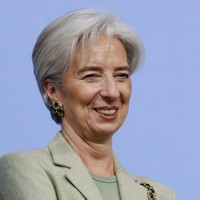Last year, shortly after being named managing director of the International Monetary Fund, Christine Lagarde delivered a speech at the Council on Foreign Relations in which she noted that the fund needs to look beyond purely economic factors in evaluating issues that may threaten macroeconomic stability in borrowing countries. Unfortunately, in its handling of the Greek debt crisis, the fund failed to implement Lagarde’s more holistic approach and instead limited itself to economic considerations in addressing the country’s woes. The results so far in Greece demonstrates the urgent need for deep reforms of IMF conditionality. In particular, moving forward, the fund must take the politics of economic adjustment seriously if it hopes to improve the outcomes of its programs.
IMF conditionality takes the form of policies that countries need to adopt in order to make their economies more competitive, in return for the fund’s bailout loans. These policies, which include cutting spending, raising taxes, reducing inflation and adopting structural reforms, are frequently politically unpopular because of their initially painful impact. For obvious reasons, political leaders often shy away from implementing reforms that will antagonize voters. Vested interests that stand to lose from reforms can also seek to block them, further reducing the chances that the IMF-approved program will be fully implemented. The success or failure of an IMF country program, then, depends as much on whether the economic reforms are politically feasible as on the economic advice itself.
Over the past 20 years, a growing body of scholarship has led the IMF to accept this reality. The key term in these discussions is “borrower ownership,” which refers to the notion that country leaders have to be committed to an adjustment program for it to succeed. It further implies that the fund should assess the degree of ownership as a precondition for lending. In 2002, borrower ownership was integrated as policy into the IMF’s conditionality guidelines (.pdf), which state that “national ownership of sound economic and financial policies and an adequate administrative capacity are crucial for successful implementation of fund-supported programs.”

